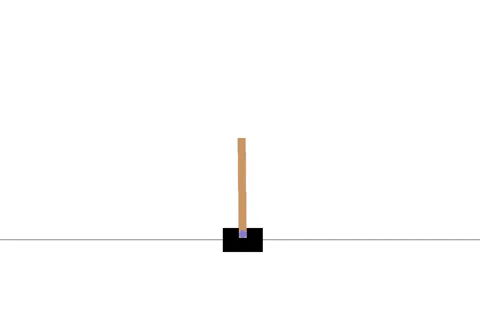static void Main(string[] args)
{
// Configuration parameters for the whole setup
var seed = 42;
var gamma = 0.99; // Discount factor for past rewards
var max_steps_per_episode = 10000;
// var env = gym.make("CartPole-v0"); // Create the environment
CartPoleEnv env = new CartPoleEnv(WinFormEnvViewer.Factory); // Create the environment
env.Seed(seed);
// var eps = np.finfo(np.float32).eps.item(); // Smallest number such that 1.0 + eps != 1.0
var eps = 1e-5; // Smallest number such that 1.0 + eps != 1.0
/*/
* //// Implement Actor Critic network
*
* This network learns two functions:
*
* 1. Actor: This takes as input the state of our environment and returns a
* probability value for each action in its action space.
* 2. Critic: This takes as input the state of our environment and returns
* an estimate of total rewards in the future.
*
* In our implementation, they share the initial layer.
* /*/
var num_inputs = 4;
NDArray num_actions = 2;
var num_hidden = 128;
LayersApi layers = new LayersApi();
var inputs = layers.Input(shape: (num_inputs));
var common = layers.Dense(num_hidden, activation: "relu").Apply(inputs);
var action = layers.Dense(num_actions, activation: "softmax").Apply(common);
var critic = layers.Dense(1).Apply(common);
Model model = keras.Model(inputs: inputs, outputs: (action, critic));
/*/
* //// Train
* /*/
var optimizer = keras.optimizers.Adam(learning_rate: (float)0.01);
var huber_loss = keras.losses.Huber();
var action_probs_history = new List <double>();
var critic_value_history = new List <dynamic>();
var rewards_history = new List <double>();
double running_reward = 0;
var episode_count = 0;
while (true) // Run until solved
{
Program.state = env.Reset();
double episode_reward = 0;
using (var tape = tf.GradientTape())
{
for (int timestep = 1; timestep < max_steps_per_episode; timestep++)
{
//env.Render(); // Adding this line would show the attempts
// of the agent in a pop up window.
Program.state = tf.convert_to_tensor(Program.state);
Program.state = tf.expand_dims(Program.state, 0);
// Predict action probabilities and estimated future rewards
// from environment state
// var (action_probs, critic_value) = model.Apply(Program.state);
var pred_result = model.Apply(tf.cast(Program.state, tf.float32));
var action_probs = pred_result[0][0];
var critic_value = pred_result[1][0][0];
critic_value_history.Add(critic_value);
Tensor probabilities = np.squeeze(action_probs);
Console.WriteLine(probabilities);
// Sample action from action probability distribution
NDArray chosen_action = np.random.choice(num_actions, probabilities: probabilities.);
action_probs_history.Add(tf.math.log(action_probs[0, chosen_action]));
// Apply the sampled action in our environment
var(state, reward, done, _) = env.Step(chosen_action);
rewards_history.Add(reward);
episode_reward += reward;
if (done)
{
break;
}
}
// Update running reward to check condition for solving
running_reward = 0.05 * episode_reward + (1 - 0.05) * running_reward;
// Calculate expected value from rewards
// - At each timestep what was the total reward received after that timestep
// - Rewards in the past are discounted by multiplying them with gamma
// - These are the labels for our critic
dynamic returns = new List <double>();
double discounted_sum = 0;
var reverse_rewards_history = rewards_history;
reverse_rewards_history.Reverse();
foreach (double r in reverse_rewards_history)
{
discounted_sum = r + gamma * discounted_sum;
returns.Insert(0, discounted_sum);
}
// Normalize
returns = np.array(returns.ToArray());
returns = (returns - np.mean(returns)) / (np.std(returns) + eps);
returns = returns.ToList();
// Calculating loss values to update our network
var history = zip(action_probs_history, critic_value_history, returns);
var actor_losses = new List <double>();
var critic_losses = new List <double>();
foreach (double[] item in history)
{
var log_prob = item[0];
dynamic value = item[1];
dynamic ret = item[2];
// At this point in history, the critic estimated that we would get a
// total reward = `value` in the future. We took an action with log probability
// of `log_prob` and ended up recieving a total reward = `ret`.
// The actor must be updated so that it predicts an action that leads to
// high rewards (compared to critic's estimate) with high probability.
var diff = ret - value;
actor_losses.Add(-log_prob * diff); // actor loss
// The critic must be updated so that it predicts a better estimate of
// the future rewards.
critic_losses.Add(
huber_loss.Call(tf.expand_dims(value, 0), tf.expand_dims(ret, 0))
);
}
// Backpropagation
dynamic loss_value = actor_losses.Sum(x => Convert.ToDouble(x)) + critic_losses.Sum(x => Convert.ToDouble(x));
var grads = tape.gradient(loss_value, model.trainable_variables);
optimizer.apply_gradients(zip(grads, model.trainable_variables));
// Clear the loss and reward history
action_probs_history.Clear();
critic_value_history.Clear();
rewards_history.Clear();
}
// Log details
episode_count += 1;
if (episode_count % 10 == 0)
{
var template = String.Format("running reward: {0} at episode {1}", running_reward, episode_count);
Console.WriteLine(template);
}
if (running_reward > 195) // Condition to consider the task solved
{
Console.WriteLine(String.Format("Solved at episode {0}!", episode_count));
break;
}
}
/*/
* //// Visualizations
* In early stages of training:
* 
*
* In later stages of training:
* 
* /*/
}